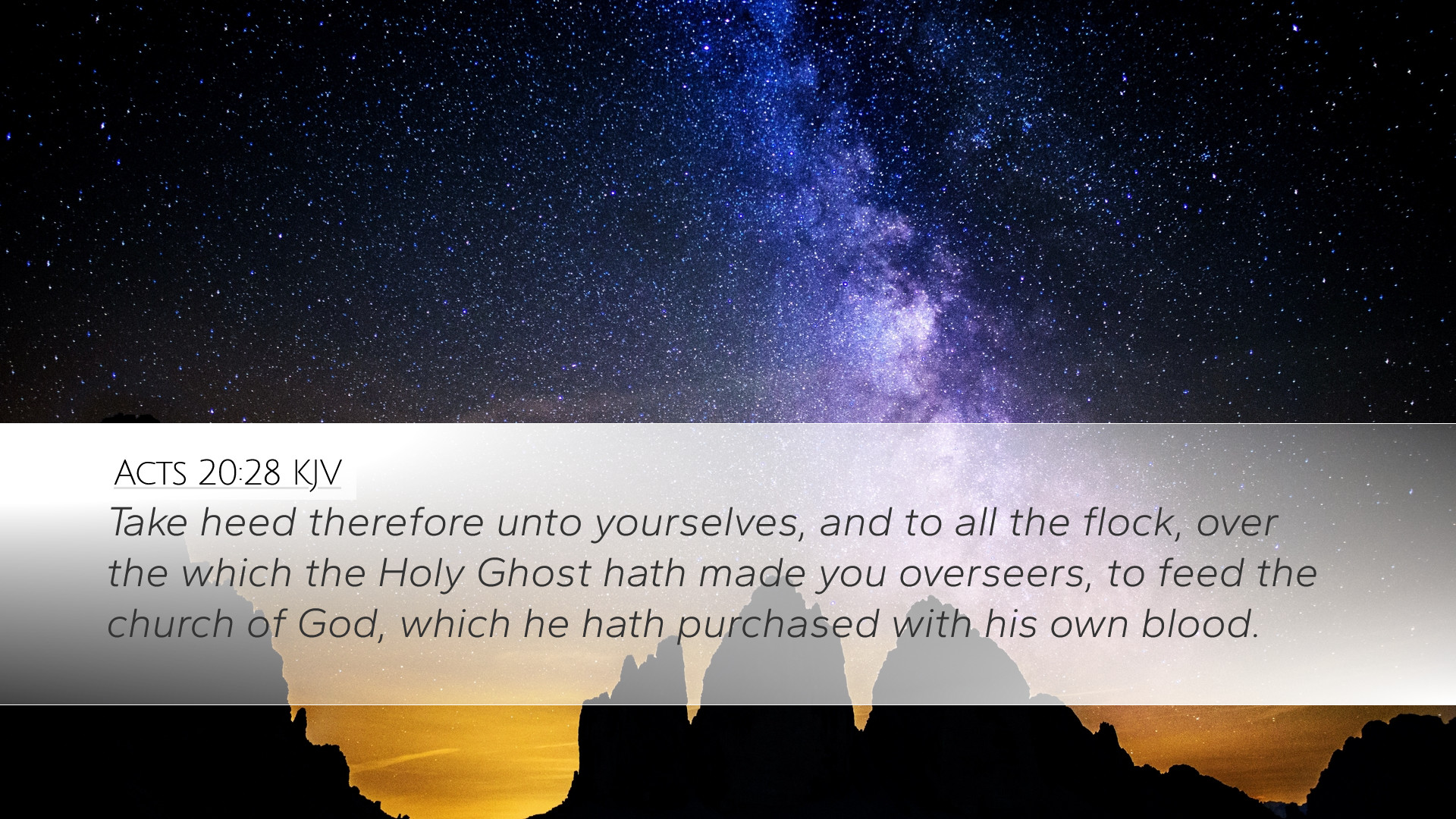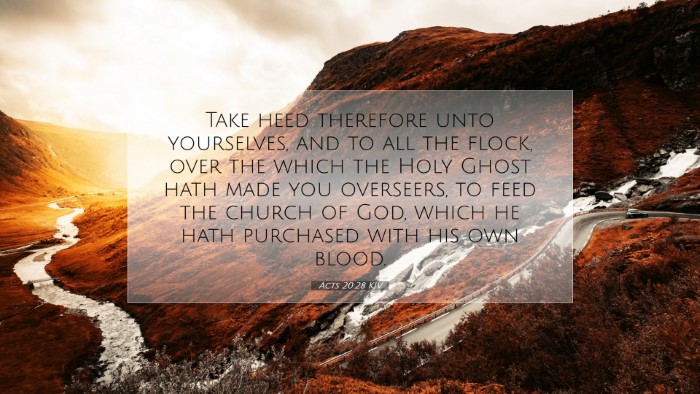Commentary on Acts 20:28
Verse: “Take heed therefore unto yourselves, and to all the flock, over the which the Holy Ghost hath made you overseers, to feed the church of God, which he hath purchased with his own blood.”
Introduction
Acts 20:28 captures a pivotal moment in Paul's farewell address to the Ephesian elders, reflecting his heartfelt concern for their spiritual welfare and the responsibility they bear as shepherds of the church. This verse encapsulates key themes such as the seriousness of leadership, the divine calling to ministry, and the high cost of redemption.
Exegesis of the Verse
This verse is rich in theological implications and offers significant pastoral guidance. The phrase “Take heed therefore unto yourselves” serves as a poignant reminder that leaders must first ensure their own spiritual health before they can effectively lead others.
-
Self-Examination:
Paul's admonition underscores the necessity of self-care and spiritual diligence. As Matthew Henry points out, the spiritual state of the shepherd directly affects the flock’s wellbeing. Leaders are called to examine their own lives, ensuring they live according to God’s standards, which will reflect in their ministry.
-
Responsibility to the Flock:
Following the call to self-examination, the verse emphasizes the responsibility that church leaders have toward their congregations. Albert Barnes notes that the term “flock” signifies ownership and a deep relational obligation. The leaders are tasked with the spiritual oversight of those God has entrusted to them.
-
Divine Appointment:
Paul reminds the elders that they have been appointed by the Holy Spirit. As Adam Clarke explains, this divine appointment grants them authority that is rooted in God’s sovereignty. It highlights that their ministry is not merely a human enterprise but a sacred calling.
The Church as God’s Possession
The later part of the verse, “to feed the church of God, which he hath purchased with his own blood,” shifts focus to the nature and worth of the church. This phrase reveals critical truths about the identity of the church and the cost of salvation.
-
Christ’s Sacrifice:
Here, Paul points to the profound truth that Jesus Christ laid down His life for the church. The blood of Christ signifies the price of redemption. Matthew Henry elaborates on this by stating that this purchase is not only a formal transaction but also an act of deep love and commitment.
-
The Church's Value:
Understanding that the church has been purchased by the blood of Christ gives believers a sense of identity and purpose. As Barnes remarks, this notion elevates the significance of the church in God’s grand design and should inspire leaders to nurture and protect it with diligence and care.
-
Feeding the Flock:
Feeding the church requires leaders to provide spiritual nourishment through teaching, preaching, and pastoral care. Adam Clarke emphasizes that this feeding must be both doctrinally sound and spiritually enriching, addressing the diverse needs of the flock.
Theological Insights
Acts 20:28 serves as a cornerstone for understanding the responsibilities and privileges of church leadership.
-
Pastoral Care:
Pastors are called to care for their congregations, mirroring the Good Shepherd who lays down His life for the sheep. This theme of pastoral care calls for leaders who are vigilant and compassionate, reflecting Christ’s love for His people.
-
Accountability:
The call to “take heed” implies accountability before God. Leaders must recognize that they will one day answer to God for how they tended to His flock. This truth serves as both a comfort and a caution in pastoral ministry.
-
Empowerment of the Holy Spirit:
Being made overseers by the “Holy Ghost” means that leaders are empowered by the Spirit to fulfill their calling. This divine empowerment is essential for effective ministry and is a source of strength amid challenges.
Conclusion
Acts 20:28 encapsulates profound truths about church leadership, the value of the church, and the sacrificial love of Christ. As pastors, students, theologians, and scholars study this verse, they are reminded of the weighty responsibility that comes with leadership, the necessity of spiritual vigilance, and the beautiful truth that the church is cherished by God.
In the spirit of Paul's exhortation, may church leaders be encouraged to lead with integrity and love, feeding their congregations with the rich truths of Scripture, empowered by the Holy Spirit, and always mindful of the great price paid for their souls.


